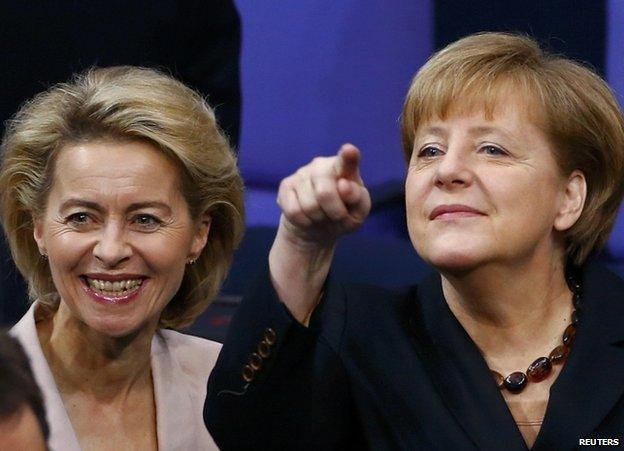German parliament confirms Angel Merkel for new term
- Published

It has taken nearly three months of negotiation to assemble the new government
Angela Merkel has been confirmed as German chancellor for a third term, at the head of a grand coalition, by a vote in the Bundestag (parliament).
The coalition between her centre-right CDU/CSU bloc and the Social Democrats (SPD) has a huge majority, with 504 of the 631 seats in the lower house.
Mrs Merkel was confirmed by 462 votes, with nine abstentions.
Germany's tough stance on fiscal discipline is unlikely to change under the new coalition.
The SPD's membership voted on Sunday to back the coalition after painstaking negotiations.
The party hammered out a minimum national wage, an hourly rate of 8.50 euros (£7.11; $11.55) that will come into force for the first time in 2015.
The new government will be slightly to the left of the previous one, in which the Christian Democrats/Christian Social Union were in coalition with the market-oriented Free Democrats (FDP), the BBC's Steve Evans reports from Berlin.
But the SPD will form a minority part of the government and no-one doubts that Chancellor Merkel will be in charge, our correspondent says.
As the EU's most industrialised and populous state, with its biggest economy, Germany dominates decision-making for the eurozone.
New faces
"I accept the election result and thank you for your trust," said Mrs Merkel after the confirmation vote in the Bundestag. Smiling, she received a bouquet of flowers and shook hands with other MPs.
She was due to visit President Joachim Gauck at his palace before returning to parliament to be sworn in.
For Tuesday's vote, 621 members of parliament were present, of whom 150 voted against Mrs Merkel.
Between them, the Left Party and the Greens have 127 seats, so at least 23 of those who rejected her nomination were from the parties making up the new coalition.
The coalition talks had been the longest for any German government since since World War 2.
The BBC's Stephen Evans says the swearing in of the coalition means "business can resume"
The CDU/CSU and SPD finally signed the deal, a 185-page agreement entitled "Shaping Germany's Future", late last month.
Mrs Merkel was obliged to turn to the SPD after the FDP failed to win any seats in the 22 September election, falling short of the 5% hurdle to enter the Bundestag.
Trusted Merkel ally Wolfgang Schaeuble will remain finance minister in the new government, one of 10 CDU/CSU politicians in the 16-strong cabinet.
"His name stands for euro stability and I'm glad that he's continuing," Mrs Merkel said after news of the new line-up emerged.
Other CDU/CSU picks include Ursula von der Leyen as defence minister and Thomas de Maiziere as interior minister.
For the SPD, party chairman Sigmar Gabriel will become economy minister and deputy chancellor, while Frank-Walter Steinmeier will be foreign minister.